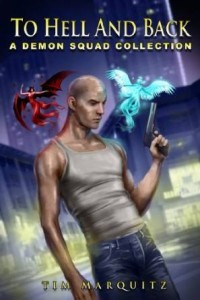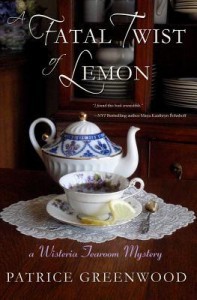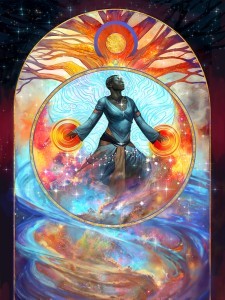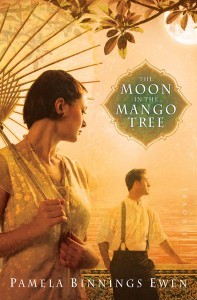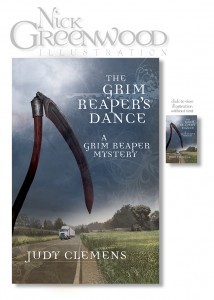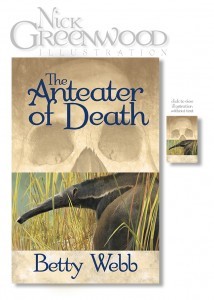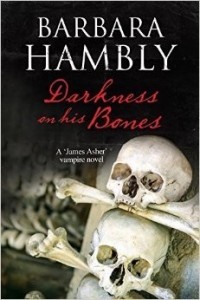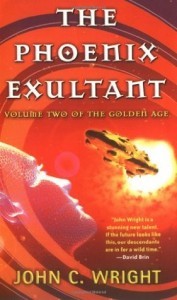Rachel Neumeier's Blog, page 335
June 30, 2015
Recent Reading: An Aria of Omens by Patrice Greenwood
Well, shoot, I didn’t expect to zip through the third book in the Wisteria Teahouse series quite that quickly. But I have to say . . . I think the series really hits its stride with this volume. I had a tough time putting it down.*
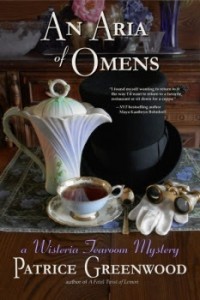
OLYMPUS DIGITAL CAMERA
You know what? I’m not so very sure this particular installment in the series fits in the cozy mystery subgenre terribly well. A Fatal Twist of Lemon is light and charming. A Sprig of Blossomed Thorn is a bit less light, its action playing out against a thematically deeper background. And An Aria of Omens? Actually significantly darker and more serious. I like that, in fact, so though I enjoyed the first two, this one stood out for me.
It also had some really nice lines in it. This is the first volume where I found myself bookmarking pages so that I could mention them in a post. Like here, where one of the characters, an apprentice in an opera company, is explaining the plot of Serse by George Frideric Handel:
… Serse is enraged, and in this aria, he calls on the Furies to inspire him with their venom. He wants the world to turn to ash and the sun to be exclipsed by the heat of his fury. I’m sure we’ve all had days like that.
Hah! I might have actually laughed out loud.
Beyond the nice writing, though, here’s where An Aria of Omens succeeds, and actually in quite surprising ways:
1. When Detective Aragon is bouncing ideas about the murder off Ellen, even though he is not supposed to talk about these kinds of things with non-colleagues, it actually makes sense that he would be doing that. It makes sense on a personal level and it also makes sense on a professional-cop level. That’s hard to pull off; I generally don’t really believe it unless the detective and the female lead are married and have been a long time or something like that. Making it work by making the detective stupid is just offensive. But Greenwood totally made me believe in this interaction between Tony and Ellen. I was impressed.
2. I actually thought the murderer was someone else for quite some time. I had the murderer and the motive both wrong.
3. I did not expect the second victim, but not only was her death one of the things that misled me, it worked really well to give this story a deeper, sadder, less cozy and more real flavor.
4. At the end, after it’s clear who the murderer is, the author does not force Ellen into peril so as to have her rescued in a climactic scene. Not even so that she can rescue herself or someone else. Nope, Ellen stays away from the murderer, stays around other people, keeps herself safe, and the murderer is arrested offstage while she and most of the important secondary characters are busy dealing with their own lives. I thought that was just fantastic. Also, Greenwood has made me interested in the details of daily life, so I didn’t feel cheated of action by having no fast-paced climactic violent scene at the end.
Where else the story succeeds:
The relationship between Ellen and Tony Aragon is still in the process of development. This definitely is the opposite of the insta-love trope. There are real obstacles between the two — not only is she Anglo and he Hispanic, which in Santa Fe, as we saw in the second book, apparently creates potential problems — but also the other differences in their backgrounds can’t be fluffed lightly out of the way. I love how Greenwood is handling this element of the series. And I’m pleased on a detail level that Greenwood is not pushing Ellen’s dislike of Tony carrying a gun in this story, at least not very much. Especially because the murderer in this one is plainly very dangerous.
Greenwood has set a number of hooks that make me curious about minor plot elements. Generally with just a couple of words or a line or two, she makes me feel like I really want to know what is up with this or that. How *about* that ghost? Man, that counselor is a bit weird. And so on. Also, I’m just more and more pleased with the setting, and I don’t even like tea.
Almonds aren’t my personal favorite, either, but it was a *very* good idea to provide the recipe for the Aria Cake in the back of the book. Food is so important in these books that Greenwood should definitely provide at least one recipe per book. Mmm.
Anyway, the first book was good, the second was also good, and this one was excellent. I preordered the next book in the series, which I see is due out in just a couple of weeks, so that’s timely.
* I did manage to get my minimum words for my own WIP done for yesterday. But barely. Eh, books that are not just readable but compelling, not actually what I need right now. Switching mostly back to nonfiction for a while.

June 29, 2015
One more note on the pro artist category
A commenter kindly contributed links to some of Carter Reid’s book covers. This is my favorite — if you’d like to see the others, click through via the links in the comments to the Hugo post below.
Reid’s other covers look rather pulp style, which is not really my thing, but I do like this one.
And at least now I don’t have to think about putting No Award on the ballot. It’s a pity Reid didn’t put some of his works in the Hugo packet so they’d have been easier to find.

Ah, the Locus Awards!
Very nice to see these winners for Locus Awards this year:
FANTASY NOVEL
Winner: The Goblin Emperor, Katherine Addison
Steles of the Sky, Elizabeth Bear
City of Stairs, Robert Jackson Bennett
The Magician’s Land, Lev Grossman
The Mirror Empire, Kameron Hurley
Obviously I’m very pleased. Go, Katherine / Sarah!
In other categories:
SCIENCE FICTION NOVEL
Winner: Ancillary Sword, Ann Leckie
The Peripheral, William Gibson
The Three-Body Problem, Cixin Liu
Lock In, John Scalzi
Annihilation/Authority/Acceptance, Jeff VanderMeer
Which also makes me happy.
YOUNG ADULT BOOK
Winner: Half a King, Joe Abercrombie
The Doubt Factory, Paolo Bacigalupi
Waistcoats & Weaponry, Gail Carriger
Empress of the Sun, Ian McDonald
Clariel, Garth Nix (Harper; Hot Key; Allen & Unwin)
FIRST NOVEL
Winner: The Memory Garden, Mary Rickert
Elysium, Jennifer Marie Brissett
A Darkling Sea, James L. Cambias
The Clockwork Dagger, Beth Cato
The Emperor’s Blades, Brian Staveley
I did not know A Darkling Sea had been nominated. I’m particularly pleased by that. I think it really, really should have been nominated for the Hugo. I haven’t read any of the other works in this category, though, so I can’t say how it compares to any of the other nominees or to the winner.
If you’re interested, you can click through and check out the nominees and winners for the short fiction and other catagories. The authors of the short fiction categories are all familiar, but I haven’t read any of the shorter works listed. Relevant to the recent discussion about the proposed series award for the Hugo: notice that the short fiction authors are in fact all established authors. The only one I hadn’t heard of myself is Amal El-Mohtar, no doubt because she’s only written short works, but even she probably counts as established because she seems to have a fair number of stories out.
Anyway, congratulations to the winners and three cheers for The Goblin Emperor winning its category!

Recent Reading: A Fatal Twist of Lemon by Patrice Greenwood
The first day my tearoom opened was wonderful – mostly. Funny how life can go swimmingly one moment and fall to pieces the next.
So, a cozy mystery. I picked it up, in the sense of opening the kindle file that’s been sitting here for quite a while, because I wanted to read something with a plot, but not something that would get in my way while I work on my own project. A contemporary cozy mystery fit the bill. It would have been even better for the purpose if I hadn’t liked it particularly, but in fact I foundA Fatal Twist of Lemon had a good deal of charm. The writing is good, the setting seems well drawn although I’m not familiar with Santa Fe, the characters are appealing, and the mystery itself is . . . well, not that mysterious, but on the other hand, though I was not surprised to find out who the culprit was, I also wouldn’t have been surprised if it had been someone else, so I guess actually the red herrings were fairly effective. Also, I don’t read mysteries for the mystery per se. I read mysteries almost entirely for character and setting.
The main character, Ellen, has just opened the Wisteria Tearoom in a nice area of Santa Fe. The whole point, as far as Ellen is concerned, is to create a beautiful, peaceful, Victorian setting in which people can settle down for a civilized afternoon tea. To this purpose, she offers elegant decor, fresh flowers, and above all delightful food, which incidentally is described in the most mouthwatering terms.
The murder of one of the tearoom’s first patrons is a bit of a setback for establishing the desired atmosphere, as you might imagine. The ghost who sets the bobbles on the chandelier swaying, however, is a nice addition to the decor. I rather enjoyed the ghost.
Since this is a modern cozy mystery, we would expect an important romantic component. Detective Aragón is pretty offensive at the beginning, so much so that I thought it was going to be a bit of a trick to handle the shift, obviously coming up, from annoying-jackass-cop to sympathetic-male-lead. The author pulled it off, though, and rather more effectively than I expected.
In a cozy mystery, one of the challenges is to have the main character, who is not a cop, solve the mystery, without making the cops look like total morons. Greenwood managed this because just about every time Ellen discovered a tidbit of information and passed it on to Detective Aragón, he already knew it. The bit of information that actually solved the crime was reasonably something the police might not have known. The way Ellen put herself in danger at the last minute was intensely stupid, but I suppose not completely unreasonable given the sort of person she is. Though I would have preferred her not to do that. Honestly.
Anyway, I went on and picked up the second book, A Sprig of Blossomed Thorn, which incidentally is a wonderful title. I liked that one, too. We get to see all the characters develop and deepen, which is one of the main pleasures of a cozy mystery series. I’m particularly interested in seeing what’s going on with Kris, the business manager of the tearoom.
Racism plays an important role in developing the plot of the second book, but thank heaven, the story doesn’t come across as heavy-handed Message Fiction, which is actually quite an accomplishment these days, where too often The Message is piled on with a shovel, as though the author believes the point of telling a story is to show off how progressive she is. That wasn’t the case here. The setting really helped with that. I’m still not familiar with Santa Fe, but I can believe that the racial tensions in the area are exactly as portrayed in the book.
I’m going to go ahead and pick up the third book, um . . . okay, An Aria of Omens, and we’ll see where Greenwood takes that one. I will say that if Tony Aragón stops wearing his gun off-duty to please Ellen, I am going to be annoyed. For a different kind of male lead, that might work, but no one knows better than a cop that you *just never know* when a bad guy is going to start shooting up, say, the opera house. I don’t believe for one second that any competent cop would give way to the idea that it’s better to be unarmed in the face of disaster, even if he’s attracted to a woman whose life has been sufficiently protected that she doesn’t really believe violence is possible. Which she should be getting over, what with having had two women murdered in her immediate vicinity in the recent past.
So we’ll see.
In the meantime, reading this series makes me seriously want some scones. I’m doing a no-carb week, alas, but next week, these, from the King Arthur Flour Whole Grain Baking cookbook, are probably going to make an appearance:
Coconut Chocolate Chip Scones
2 C white whole wheat flour
1 C white flour
¼ C sugar
¼ C brown sugar
2 tsp baking powder
½ tsp salt
½ C cold butter
1 C sweetened shredded coconut
1 egg
1 ¼ C unsweetened coconut milk
1 tsp vanilla
½ tsp coconut extract
¾ C chocolate chips, which King Arthur says are optional, but really, you definitely want to put them in. I prefer a bittersweet chocolate here.
Milk, for brushing
¼ C sweetened shredded coconut, for sprinkling
Whisk together dry ingredients. Cut the butter in with a pastry cutter. Stir in the coconut. Whisk together the egg, coconut milk, and extracts. Add to dry mixture and stir just to combine. Add the chocolate chips. Turn out onto a work surface and knead a couple of times to bring the dough together. Divide in half and place each lump on a parchment-lined baking sheet. Pat the dough into two circles about ½ inch thick and 6 inches in diameter. Cut each circle into 8 wedges.
Now, either bake the scones or slide the whole baking sheet into the freezer. Scones don’t hold over well, so you may not want to bake the whole batch; but the dough freezes well (as Greenwood indicates in her book, btw, and she is perfectly right), so you can cut the dough into wedges, freeze it, wrap the wedges in plastic wrap and put them in a freezer bag, then keep them frozen till right before you want to bake them. This barely changes the baking time, though of course they will take just a bit longer. There’s no need to thaw the dough before baking.
Before baking, brush with milk and sprinkle with coconut. Bake at 375 degrees for 20 minutes or a bit longer. If you want to make a chocolate glaze, well, it’s probably not necessary, but hey, I won’t judge.

June 26, 2015
Another note on the proposal for a “saga” award
So, I happened across this post by NK Jemisin, regarding the proposal for a new Hugo category for series.
Now, Jemisin is one of my favorite new fantasy authors. I have loved all her books so far, particularly THE SHADOWED SUN, but it’s hard to choose, because seriously, all of them. However, here is what she has to say about the possible “saga” award:
The “sagas” proposal privileges not just established authors as John Scalzi notes, but established successful white male authors. Systemic bigotry being what it will, it’s tougher for people from underrepresented groups to survive in this area, let alone thrive in the way that a multipart series would indicate.
To which I must admit that my response is . . . really? Women are not succeeding in writing series?
Well, it’s true that my library is biased toward my personal taste, but let’s just take a look:
SERIES BY WOMEN
The Range of Ghosts series by Elizabeth Bear
The Chalion series, the Sharing Knife series, and the Vorkosigan series by LMB
The Natural History of Dragons series by Marie Brennan
The Demon’s Lexicon series by Sarah Rees Brennan
The Mercy Thompson series by Patricia Briggs
The Girl of Fire and Thorns series by Rae Carson
The Foreigner series and the Fortress series by CJC, among earlier works
The Ysidro series by Barbara Hambly
The Dragon series and lots of others by Robin Hobb
The Inheritance trilogy by NK Jemisin
The Sevenwaters series and others by Juliet Marillier
The Oath of Fealty and the earlier Paksenarrain series, plus the Hunting Party series and the Trading in Danger series, all by Elizabeth Moon
The Temeraire series by Naomi Novik
The Beka Cooper series by Tamora Pierce
The Divergent series by Roth
The Hunger Games series by Collins
The Raven Boys series by Maggie Stiefvater
The Raksura trilogy by Martha Wells
. . . and then I got tired and stopped. Those are the series in the hardcover section of my library, without moving into the paperback section or turning on my Kindle.
And in the hardcover section, how many series do I have by guys?
SERIES BY GUYS
The Taltos series by Brust
The Lightbringer series by Brent Weeks
The Thousand Names series by Django Wexler, which doesn’t have the third book out yet but will soon
The Pathfinder series by Orson Scott Card
Plus I have the first book of the Dagger and the Coin series by Daniel Abraham and Leviathan’s Wake by James SA Corey, but then I have the first book only of a couple series by women, too, so that doesn’t change the proportion, which is obviously better than 4:1 women to men.
So. This is no doubt separate from questions of whether women authors get reviewed as often as male authors, or whether their titles stay in bookstores as long as those by male authors, or other such questions.
But right offhand . . . I do not find arguments that women are not succeeding in the longer series form persuasive. At all.
For the other question, about whether a series award would privilege established authors? Of course it would. But all awards privilege established authors, in the short forms as well as the long forms. Everything Ken Liu or Rachel Swirsky writes is actively sought out and read with an eye toward nominating it by a large number of people who nominate stories, which is not the case and cannot be the case for a newly published author. This does not strike me as a good reason for ending all awards. So the idea that a series award is out of line for this reason also does not persuade me.
Could a great series like Foreigner, with a fairly, shall we say, self-selected readership, compete with anything that has been made into a movie? Probably not. Could it compete with a series by an author with A Mobilized Fan Club? I don’t know. But I’m willing to experiment. I do think a lot of series, by women and by guys, *are* award-worthy, and *are* to a considerable extent excluded from awards because they are series books. I want to see them recognized. I would like to see a series award opened up to series completed in the past rather than just ongoing series, but of course there is no shortage of ongoing series that are truly great, too. Like the Foreigner series. You all know how much I want this to be recognized as the greatest SF series ever written.
So I’m glad to see the Saga proposal, even though I think it’s a silly name and the initial framing of how to handle it was perhaps not as well thought out as it could have been. I want people to argue about this and figure out how to do it properly, and then I want a series award available before CJC finishes her Foreigner series. My personal guess is she’s only got a couple more to go, so let’s hurry the process along and have it in place by then, okay?

June 25, 2015
Just about ready to vote for the Hugo Awards
As you know, I’ve been wading through the Hugo selections for the past month or two. It takes a while, since I’m busy with other stuff, but since I got a voting membership – largely so I could vote for The Goblin Emperor in the “novel” cateogry — it would seem terribly wasteful not to vote for the short forms, too. Besides, there they are in the Hugo Voter Packet or whatever it’s called. So here we go:
Short stories
You probably remember that I am not super-fond of shorter forms and seldom to never go out of my way to read short stories. Well, stories connected to a larger work are an exception; see: Stories of the Raksura I and II. But basically short stories are not my thing. Also, I liked all the short stories I nominated and can’t help but feel it’s a shame none of those made it onto the ballot. Nevertheless, here we go:
1. “Totaled” by Kary English – Well written and solidly executed. The biggest problem I had with this story was that it is highly reminiscent of “Flowers for Algernon.” It’s impossible for any story to do it better than “Flowers for Algernon,” so the comparison can only hurt this story. Plus I am just inclined to downgrade any story that seems derivative of any famous work. Despite all that, I thought this was a solid story. Since I wasn’t too keen on any of the other stories in this category, it goes in my number one spot.
2. “The Parliament of Beasts and Birds” by John C Wright – beautifully written if you don’t mind a kind of, hmm, let’s say a florid, flowery, over-the-top ornate style. That kind of style, in fact, suited this particular story. However, I didn’t much like the story. I vehemently dislike the idea that animals are less perfect than humans and should aspire to be more like humans. I assure you that lions and foxes and so on are quite well adapted to their ecological niches and have no need to be more like human people. I know this story was using this idea metaphorically or allegorically or something, but it was impossible for me not to read it literally and I didn’t like it. But it was still a good story.
3. “Turncoat” by Steve Rzasa – I thought the writing quality was acceptable and the themes were appealing – this story was about free will and the importance of choosing moral action.
4. “On a Spiritual Plain” by Lou Antenelli – to me, the writing was just all right. I thought what Antenelli was trying to do was interesting, but the story did not really work for me. The idea that the ghost is not really the soul of the person, but just a kind of echo, reduced the impact of the story to a kind of “Sure, but so what?” for me. If the ghost isn’t really a conscious entity, who cares what happens to it? And if it thinks it’s a conscious entity, isn’t it by definition truly a conscious entity? I thought the story might have done more with that.
5. “A Single Samurai” by Steven Diamond – I’m sorry, but to me this story did not seem to have adequate writing quality to be award-worthy. For me it was a fast DNF and I will probably put No Award as my last place vote in this category.
Novelettes
1. “The Triple Sun: A Golden Age Tale” by Rajnar Vajra – I thought this story was successful for what it was trying to be, which was a sort of cheerful parody of an old-fashioned Star Trek kind of world. I found it engaging and enjoyed its light-hearted silliness.
2. “The Day the World Turned Upside Down” by Thomas Ole Heuvelt – I definitely would pick this story as the best written of the nominees. It was engaging and readable because of the high quality of its writing. It was also emotionally overwrought, disturbingly hopeless, and featured a thoroughly contemptible protagonist. Plus, although this would have been a completely different story, the outer and inner “world turning upside down” themes would have been more tightly linked if the world had turned upside down only for the protagonist, not for the rest of the world. I enjoyed reading this story, but I didn’t *like* it.
3. “The Journeyman: In the Stone House” by Michael Flynn – This story was hard to place. I found it well-written and engaging. I liked it. But it is plainly part of a larger work and does not stand all that well alone. As far as I’m concerned, that is a very significant flaw in a story that is supposed to be a self-contained novelette. That’s why I didn’t put it at the top of my list.
4. “Ashes to Ashes” by Gray Rinehart – I thought this story was decently written, moderately engaging, but rather contrived in terms of handing the aliens the one trait the author needs them to have to make the story work out.
5. “Championship B’tok” by Edward Lerner – Oh, for heaven’s sake. If you start with one protagonist in a tense situation and then switch away from him and do something else for a zillion pages and never actually come back to him, that’s a problem for me. Also, this was another so-called novelette that was quite plainly part of a larger work. On top of all that, I honestly did not find it particularly engaging – it never recaptured my interest after switching away from the opening scene. I wound up just skimming the back half of the story. It probably counts as a DNF, since I can’t really say I actually read it all the way through. For me, No Award might once again go in the last spot.
Novellas
When we hit novellas, I am more interested, because stories of this length appeal to me more than shorter works. I will say that the official Hugo definitions of novellas and novels seem crazy to me, with novellas being between 18,000 words and 40,000 words and novels anything over that. As far as I’m concerned, 40,000 words does not make a novel. I’d be fine with redrawing those lines. Even so, a novella does have enough room to stretch out a bit and do more with worldbuilding and character as well as plot.
1. “Pale Realms of Shade” by John C Wright – There’s just no question about it: This was by far my favorite of the novellas this year. This novella offered one of the few truly unlikable protagonists who has ever worked for me. Mind you, I like a lot of protagonists who are seriously flawed. But this guy was *really* unlikable. Which was necessary to the plot in all kinds of ways. Really interesting worldbuilding, really good characterization, tight plotting. Oh, and themes involving redemption generally appeal to me. So, yeah, an easy choice for first place for me.
2. “The Plural of Helen of Troy” by Wright again – This was an ambitious story involving time travel. It was clever, ornate, complicated, and used lots of allusions to historical stuff. I didn’t really like it, but I admire how it was put together.
3. “Flow” by Arlan Andrews – This was a good, engaging, straightforward story with a YA feel to it, about quest and exploration. I enjoyed it. The problem is, it is totally part of a longer work and does not really stand by itself. I believe I’ve mentioned how little I appreciate that in a nominee for a short-work category. Well, let me emphasize it again: I don’t think selected bits of longer works should ever be nominated for short-form categories. Honestly, I don’t. If you’re going to nominate a novella, find an actual novella to nominate.
But I did like the story, though.
4. “One Bright Star to Guide Them” by Wright – This story was written in an ornate, flowery style. I very much liked some of the detail work that went into it. However, I also found it rather tending to fall into the tl;dr category for me. It did not really engage my interest. The style might have contributed to that problem. For whatever reason, I barely finished it.
5. “Big Boys Don’t Cry” – This one was very grim and tragic for my taste; it was also highly reminiscent of the well-known Bolo stories by Keith Laumer. I actively disliked it and I also thought it was too derivative to be a reasonable contender for an award.
Novels
1. The Goblin Emperor by Katherine Addison/Sarah Monette. Obviously. I thought it was very unlikely that anything would change my mind about this. Nothing came close.
2. Ancillary Sword by Ann Leckie. I never much care for seeing a middle book in a series go up for an award, but I guess that will keep happening till we divide the novel category into standalone vs series categories, and the sooner the better in my opinion. I see there is actually a proposal or two now on the table about this; see below for comments and a link.
Anyway, I have seen comments here and there from people who thought Ancillary Sword was terrible. I can’t quite wrap my mind around that. I thought it was excellent, in some ways better than the first book, and I can’t wait for the third.
3. The Three-Body Problemby Cixin Liu. It was very difficult to decide which book to put in third place. What I like about this one: it undeniably possesses ambition, concept, and scope. I think these are important qualities for the Hugo. It is doing really interesting things with physics. Its plot seems reasonably tight. The use of the computer game Three-Body Problem was actually fun to read about.
What did not work for me: the story’s unbearable beginning – on the advice of my brother, I skipped ahead to avoid the Cultural Revolution part so that I could stand to read the book. Besides that, to me, the characterization seemed simply poor. Each character served as a puppet to deliver the lines of dialogue necessary to move the plot forward. The characters seemed thoroughly wooden, offering no hook for emotional engagement. I never cared about any of them. Also, aside from this, the writing quality . . . and this surprised me . . . was not great. To me it seemed both clunky and boring. I have no idea whether this was caused by the original writing or the translation.
4. Skin Game by Jim Butcher. I came much closer than I expected to putting this one third. It has everything Three-Body Problem lacks: snappy dialogue, fast action, engaging plot, decent characterization. There is sometimes a clunky passage, but basically it is fun to read. It was also surprisingly easy to follow, considering I haven’t read the first 13 or however many in the series, although the opening scene was frankly baffling. I liked it much better than Liu’s book. But . . . the 14th book in a series? Also, I really did admire the concept of Three-Body Problem, even if I didn’t actually like the book. So . . . this is how they sorted out for me in the end.
5. The Dark Between the Stars by Anderson. I didn’t like it at all. Every chapter has a different protagonist and I never had time to get involved enough with any of them to even begin to care how the overall plot might eventually pull everything together. I read about fifty pages, maybe seventy, and then quit.
So, that’s exactly the way I expected the novels to sort out for me, but the reasons the latter three went 3-4-5 were not exactly as I expected.
Movies
I didn’t expect to vote in the movie category. I almost never watch enough movies to bother voting. However, this year I’ve seen three of the five and I guess that’s enough to justify voting. So:
1. “Live Die Repeat” – I just watched this, and I liked it a lot. I mean, the opening bit, when Cage (Tom Cruse) is such a cowardly ass, is a bit difficult to take. But we rapidly get past that. And Rita (Emily Blunt) is fantastic. There’s a lot to admire about this movie. Compressing the repeated part of the day has to be tricky to do well, and I think it was done very well indeed. Cage’s personal development was beautifully handled. Starting off with Cage such a wimp and making Rita into such a kickass soldier was an excellent reversal of standard gender roles and, wow, did Emily Blunt make that work or what?
I am not 100% sure the ending worked for me. But I don’t care. I’m putting this in the top slot regardless.
2. The Lego Movie – I watched this one recently, too. It was thoroughly charming. I can’t believe anybody actually gave this concept a Go, because seriously, a Lego movie? And I’m astonished that the producers went with the extraordinarily blatant deus ex elements of the plot, but then, those were SO blatant they turned out to be fun. Like everyone else, I really enjoyed Lego Batman. “I only use black. And sometimes very dark gray.” Hah!
Shifting to the live-action scenes was . . . okay, I guess? I thought the Moral Of The Story was shoveled on with a trowel. To me, that seemed the weakest element of the movie.
3. “Winter Soldier” – I saw this much closer to when it came out; ie, a while ago. So I don’t remember everything about it. But there were definitely aspects I thought were problematical. Some of this had to do with the Winter Soldier himself; I really did not like how that was handled. Anyway, I know a lot of people liked this movie, but though I didn’t hate it, it didn’t work for me as well as the first Captain American movie.
Movies I haven’t seen: “Interstellar” and . . . whatever the other one is. I hear “Interstellar” is pretty good. Maybe I’ll still have time to watch it between now and the close of voting.
Professional artists
Okay, having taken some time to check out the various artists’ galleries . . . it turned out this was a difficult category for me. I still like Julie Dillon a great deal. For example, this is one of hers:
So, Dillon. I love a great many of her covers. But not only did she win last year, but also I turned out to really like two of the other artists as well. Here, for example, is a cover by Kirk DouPonce. I like this a lot.
And here is a cover by Nick Greenwood.
I really like the subtle scrollwork in the background. In fact, it turns out that I like most of his mystery covers, even though I don’t much care for his fantasy covers. He also definitely had the single book cover with the weirdest title:
The . . . Anteater of Death? Really? Actually, when I checked, I found that this book has a pretty decent rating on Goodreads, with quite a lot of reviews.
I didn’t like Alan Pollack’s work as well. I couldn’t pull out a picture to show here, so click on the link if you want to see his gallery. It’s not that I think he’s not doing a good job. The thing is, his style is often a pin-up-girl style that I hate.
In the end, I put the artists in this order:
1. Julie Dillon
2. Kirk DouPonce
3. Nick Greenwood
4. Alan Pollack
And then, I’m sorry, but a webcomic? With nothing but that to go on for Carter Reid, I think I must put No Award for last place. His work just does not seem to fit with the expectations for this category.
And that’s it for me! I don’t know nearly enough about the other categories to vote in them.
And, though of course I’m happy in an abstract sense for Jeff VanderMeer, who won the Nebula this year, I sincerely hope that The Goblin Emperor wins the Hugo. What with all the . . . bru-ha-ha . . . surrounding the Hugo this year, I don’t think anybody has a clue what is actually going to happen in the vote.
The best post I’ve seen about the situation with the Hugos this year, incidentally, is this recent one by Rich Horton at Black Gate. I think he is dead right about the desirability of reforming the Hugo Award so that any one person can only nominate so many works per category, and then the categories contain more works than that. I don’t think I would say that anyone can nominate up to five works and then there will be ten nominees, though. Ten is a lot. I think it is too many. My preference would be: you can nominate only four works per category, and there will be six (or, fine, eight if necessary) nominees. That should really help break the power of both bloc voting and over-the-top fan clubs to put one author on the ballot five times in a single year.
I would also be in favor of a more specific reform: No author can have more than two works up for a Hugo in one year, or more than one work per category. If more than that make the cut, the author must choose two total, one per category, and the rest must be eliminated from the ballot. No one – no one – ever has or ever will write one-fifth of all the best stories produced in a given year. It is absolutely ridiculous to allow a ballot that implies that is possible, and worse to deny exposure to other works that might otherwise be nominated
My two cents about the possible series award that has indeed been proposed: For heaven’s sake, decouple the suggestion for a series award from the suggestion to eliminate the novelette category. How ridiculous. Lots of people like the short forms.
Then, the proposal to make a “saga” eligible when it goes over 400,000 words? Are you kidding me? Who the blazes counts by words? Would anyone care to guess whether the Griffin Mage trilogy is over or under that limit? Even *I* wouldn’t know without looking! How would readers ever possibly know whether a particular trilogy made the cut or not?
If you want a series award, which I definitely do, then how about redrawing all the word boundaries, thus:
Short story: 10,000 words or under
Novelette: between 10,000 and 25,000 words
Novella: between 25,000 and 80,000 words
Stand-alone Novel: above 80,000 words
Series: three books, each not less than 80,000 words, the series to become eligible on the publication of the third book and to become eligible again on the publication of each additional book in the same series.
Here is Chaos Horizon’s model for a best case and worst case result from having a series award. Very interesting reading! Although people are suggesting various things, based on the comments at Chaos Horizon, it looks like there’s some agreement that 240,000 words in a series is more reasonable than the initial suggestion of 400,000 or whatever it was.
Me, I am optimistically confident that Hugo voters are generally savvy enough and well-read enough to go for a fantastic series like CJC’s Foreigner series over, well, a Sword of Shannara type of series, shall we say.

June 24, 2015
And now for something completely different: kitchen edition
So, I was thinking for no special reason of the things I have now in my kitchen that I did not have growing up. Some kitchen gizmos and gadgets fall under the heading Pretty But Useless, and others are useful maybe once a year, but some I reach for ALL THE TIME. I can’t believe I ever suffered along without them. So forthwith:
Top Ten Kitchen Gizmos and Gadgets that may not be necessary as such but that I’m glad I don’t have to live without. Some, as you see, are super easy to find and cheap. A few, not so much.
1. A wire whisk. I don’t know why my mother didn’t have even one whisk in the kitchen when I was growing up, but seriously, I reach for it all the time — to quickly whisk baking powder and so on into flour, say, or to combine yogurt and orange juice and an egg for Orange-Yogurt Pancakes (I add more sugar than this recipe suggests). A wire whisk does better with some tasks than a plastic whisk, but hey, any whisk is better than beating liquid ingredients together with a fork.
2. A pepper grinder. My mother still sees no point in freshly ground pepper. I think her taste buds must be peculiar, because there’s just no comparison between freshly ground pepper and pepper out of a box. I have two grinders, one for finely ground pepper and one for coarsely ground. And if I just want cracked peppercorns, I use my
3. Mortar and pestle. I have a pretty little marble mortar and pestle. I use it all the time, for cracking peppercorns or crushing coriander seeds or whatever small little task like that happens to turn up.
4. A jar opener. Even before I started having joint issues, I encountered many, many jars that I couldn’t open. If you have a guy in the house, no problem! But spaniels are not much help for this task. I prefer this kind of jar opener:
5. Mixing bowls with rubber bases. I detest mixing bowls that skid or leave marks on the counter. Rubber bases, people. And deep bowls! So that you can whisk or use a mixer and nothing spatters out of the bowl.
6. A garlic mincer. If you make Indian food, you often need to mince a lot of garlic. This gadget makes that super easy and fast.
7. An immersion blender. Nothing is more tedious or prone to mishaps as pouring soup into a blender, blending, and pouring it back into the pot. I don’t reach for my immersion blender often, but when I want it, it is there and I am glad.
8. A food processor. I make roti / chapati dough in it, I chop nuts and carrots in it, I make hummus and pesto and homemade marshmallows and, and, and … how does anybody tolerate doing all of those types of things by hand, anyway?
9. A Kitchen Aid Stand Mixer. I just got it last year. It sure is a wonderful appliance.
10. A Preethi spice grinder.
Thai curry pastes. Indian spice mixtures. Want to grind dried chilis into powder? Or turn cumin or coriander seeds into ground spices? Or hey, maybe you have oats but want oat flour. Your food processor will have a tough time with that task, but your spice grinder will take care of it no problem.
I haven’t actually been doing a lot of real cooking lately. I need to start reading one of my Indian cookbooks and go from there.

Ah, Barbara Hambly’s got a new one just about out —
A Darkness On His Bones. Well, that’s an evocative title.
Simon. Something frightful has happened to Jamie. Please come…When James Asher is found unconscious in the cemetery of the Church of St. Clare Pieds-Nus with multiple puncture-wounds in his throat and arms, his wife, Lydia, knows of only one person to call: the vampire Don Simon Ysidro. Old friend and old adversary, he is the only one who can help Lydia protect her unconscious, fevered husband from the vampires of Paris. Why James has been attacked – and why he was called to Paris in the first place – Lydia has no idea. But she knows that she must find out, and quickly. For with James wavering between life and death, and war descending on the world, their slim chance of saving themselves from the vampires grows slimmer with each passing day…
I’m not quite sure when this title is actually going to be released. Amazon says October, but I got a notice from Goodreads that says June 26th. That’s a pretty massive difference. I’m going to try to remember to check again next week and see if it’s actually out or not. Then I’ll have my modern dilemma: order it in paper to match the others? Or on Kindle because it’s cheaper and quicker?
Also, due to recent distractions beyond my control, I am now officially behind where I want to be with THE WHITE ROAD OF THE MOON. So if the book does come out in a few days, that will lead to another dilemma: read it now or let it wait? Maybe I had better let it be a bribe-to-myself for finishing the rough draft of THE WHITE ROAD.

That moment when a child actually learns to read
Here is a super-cute story at Book Riot.
If you are a parent, I bet you will be charmed silly, so you should definitely click through. If you’re not, like me, I bet you will still enjoy this brief post.
I actually remember the moment when I figured reading out. That lightning-stroke of understanding is one of my very earliest memories.

June 23, 2015
Recent Reading: The Golden Age trilogy by John C Wright
Well, The Golden Age trilogy was a unique reading experience for me.
I mean, I don’t read all that much hard SF, and this was very hard indeed. But more than that, I start a fair number of books I don’t much like. I don’t finish them. Life’s far too short to bother reading books you don’t like. If physical, those can just go on the give-away pile; if ebooks, they can be removed from the device and forgotten.
And I didn’t like this trilogy very much. Until halfway through the second book.
For the entire first half of the trilogy, I found the story intellectually interesting, but not emotionally engaging. Although Phaethon was a sympathetic protagonist and I liked him and wanted him to find out what was going on, defeat his enemies, and succeed in his aims, I wanted all those things in a kind of tepid well-it-would-be-nice sense, rather than being particularly emotionally invested in the outcome. But I’m glad I kept going, because, as I say, the story came alive for me halfway through the second book.
What made the difference? Well, partly the series of cascading disasters Phaethon suffers in the first book make it increasingly hard to engage emotionally, and those start to resolve in the second book. I mean, Phaethon still suffers reversals, some of them important, but after he first starts to recover, the reader never again has to tolerate the grim stepwise collapse of his life. So that’s a big help.
But even more important, my two favorite characters are Daphne Tercius, who is Phaeton’s wife (sort of) and Marshal Atkins (who is the only soldier the Golden Oecumene possesses, and the only one it needs). Though both Daphne and Atkins appear in the first book, they play much more important roles in the second book, and for me, Phaethon is a substantially more appealing protagonist in nearly every scene he shares with Daphne than he is when he’s alone. (Atkins I love all on his own.)
One particular scene involving Phaethon, Daphne, and Atkins takes place halfway through the second book and that scene is what kicked the reading experience from intellectual appreciation to real engagement. Here, for example, is a highly amusing exchange that takes place at that point. Remember that Phaethon and Daphne are married (more or less):
[Phaethon said] “If this machine was altered by the enemy, it could not have been for a good purpose.”
“But can’t you look at it and find out?” [asked Daphne.] “Have it check itself for flaws? Order it to re-set to zero? Do one of those things you are always doing to our systems at home whenever you are ignoring Rhadamanthus and don’t want to hear why what you’re doing is going to make things worse?”
He blinked. “Like when?”
“What about the time you collapsed the east wing of the mansion, when we were staying in New Paris? Or what about the time you were trying to re-thread all the impellers in our confluence register because you though it would get more tension out of the drive? All you did was capsize us into the lava.”
“I cannot believe you would bring that up again! That was caused by a flux in the current around us and even Boreus Sophotech said later that was an unexpected consequence of chaotic flows in the magnetic core. And I’m sorry about the wing collapsing, but I thought we could save power by running it through a nonlinear interrupt.”
Daphne rolled her eyes and looked at the ceiling. “Men!”
Have I mentioned that I really loved Daphne?
That scene also occurs near the point where it became possible, for me at least, to trust that Things Are Not As They Seem and that It Always Seems Darkest Right Before the Dawn. In other words, in every disaster from that point on, I figured probably something unexpected was actually going on that was going to rescue the situation. This was always true, and it never again took so long for specific challenges to be met and overcome. This means that the final conflict was not as stressful (for me, anyway) than the earlier, relatively lower-stakes conflicts from the first half of the trilogy.
So. My take, now that I’ve finally finished the trilogy:
The writing: Very good. Not fantastic; at least, Wright has certain writing quirks that annoyed me, plus Phaethon’s personal style is rather florid and since we’re mostly in his pov, that’s the style in which the reader is most immersed. On the other hand, I just re-read the Honor Harrington series, so I can certainly say that as far as I’m concerned, Wright is a better writer than David Weber. Do you know, both authors sometimes use a “?!” when a character exclaims? I hate that. It is so comic-book-y. But hey, if Weber can get away with it, I can hardly declare it’s beyond the pale for Wright to do it.
The setting: Amazing. Outstanding. Highly engaging intellectually. The society of the Golden Oecumene is so advanced, in ways that are simultaneously believable and virtually impossible to imagine.
The characterization: Decent. There’s enough depth of characterization that a character reader, which I mostly am, can enjoy the story – though as I say, I strongly preferred a couple of the secondary characters to the primary protagonist.
The plot: For an astonishing proportion of the book, the reader does not know what’s going on. Sometimes the reader blatantly doesn’t know what’s going on (the early lost-memory part of the story), but later the reader is repeatedly shown one thing when actually something else is going on. This is done by frequently having the pov characters know things or believe things that aren’t true. Wright is actually playing fair with all this: clues are scattered throughout so you can see, after you actually find out what was happening, that there were indeed hints about what was really happening.
At the end, the overall plot turns out to be surprisingly tight. It’s pretty much impossible to see how tight until the end, and then suddenly Wright catches the dangling edges of all kinds of threads and weaves them back into the structure of the story. I was impressed.
The scope: Huge. This is a highly ambitious work, not just in scope, but in all kinds of ways. I believe this trilogy was Wright’s debut. That’s amazing. If there was a series award for the Hugo, something I would very much like to see, I would look for something like this to nominate.
The themes: Thoroughly appealing. Of central importance are ideas about personal responsibility, duty vs freedom, the breaking of stagnation, and the importance of stories (“It’s tales that make the difference. Facts kill; but it is myths that people give their lives for.”).
The utopia: Remember, I read this because of our earlier discussion about utopias. Well, I liked Phaeton’s last comment about utopias:
Diomedes leaned back and inspected his friend. “Hmm. My intuition tells me you are still uneasy.”
Phaethon sighed. “I am getting tired of always acting on blind faith. When I do not have gaps in my memory, I have gaps in my knowledge. I always seem to be forced to trust that either my old self or some Sophotech has thought out the details of what I am about to do, and has already arranged everything to come out right – it is a childish way to behave. I am tired of being a child.”
Diomedes made his eyes crinkle up with a smile. “You are so impatient to leave this ‘utopia?’”
“It was never really a utopia. It is a good system. Maybe the best system. But in reality, everything has a cost. The cost of living in a system with fairly benevolent giant superintellects, frankly, is that you have to live as I have done. Blindly.”
Living in the Golden Oecumene seems so complex in, well, in scary ways. But I have to say . . . it is pretty close to being a utopia for most of the people who live in it, at least during the Golden Age. Not that everybody’s happy, of course. But then, if people couldn’t choose to be unhappy, it’d be a lot less utopian.
The ideal reader: In order to be engaged by this trilogy, I think the reader has to enjoy complicated, ornate, nonstandard settings; technological extrapolation; and exposition. I think plot readers are going to like it better than character readers.
I think that readers who particularly enjoy Kim Stanley Robinson should give The Golden Age trilogy a try. Robinson is the better writer – in particularly, a lot of his description and exposition reads like poetry – but then, Robinson is an outstanding writer who’s been at it a lot longer.
This trilogy also makes me think of stories like Ringworld by Larry Niven and the Gaian trilogy by John Varley. I would also actually be very curious to know what readers who love Ancillary Justice would make of The Golden Age trilogy, because despite the differences between the two works, in some ways I think they are doing similar things.
If you’ve read The Golden Age, what else would you consider similar?
Now I need to read The Player of Games to compare that utopia with this one …


